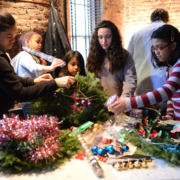December is always an exciting time at The Foundling. Our kids and families get to experience the magic of the holidays and build memories that will last a lifetime. This holiday season, our supporters, staff and volunteers have, once again, helped us create events that are especially meaningful to our children, some of whom may be experiencing the joy of the season for the very first time in loving, stable homes.
P.J. Clarke’s, the legendary and historic restaurant/bar in the City, generously hosted a wreath decorating party complete with a breakfast and lunch buffet for thirty kids in our Mott Haven Leadership program. The children and their families transformed the wreaths, donated by Ariston Flowers, into colorful pieces of art. The wreaths are on display in the Sidecar at P.J. Clarke’s midtown location where visitors are enjoying them throughout the holiday season.
Every year, volunteers from Macy’s decorate the lobby of our headquarters at 590 Avenue of the Americas and this year the décor is as grand as ever. Trees, wreaths and garlands adorn the walls bringing the holiday spirit into our Foundling home. The Macy’s team installed a mailbox for letters to Santa so that our kids have a direct line of communication with the big man from the North Pole. And the generosity doesn’t stop there. Macy’s also held a holiday party for our Crisis Nursery families. The party included a full dinner buffet, face painting and carolers.
Our friends at Ballet Ambassadors, Inc., a non-profit organization that gives under-served children and teens a one-of-a-kind opportunity to perform in the great ballets alongside professional dancers, hosted the annual Nutcracker Ballet event at our Haven Academy Charter School in the South Bronx. Professional dancers taught our students dance routines from the world-renown holiday ballet. After an entire morning of rehearsing, our kids performed the ballet in costume in front of an audience filled with school staff, families and peers. The event also garnered widespread media coverage with stories published in major publications including The Wall Street Journal, New York Daily News and The Epoch Times.
The Foundling’s Mother Child Program is one of our most important programs because it equips young mothers with the tools they need to become responsible parents. Many of these young women never learned what teenagers typically learn during their formative years and have never had the opportunity to experience the joyfulness of the holidays. This year, The Foundling’s Junior Board members have donated gift cards from stores like The Gap and Old Navy to all 28 mothers involved in the program. This contribution will give our young mothers the valuable sense that they were personally considered in someone’s holiday giving.
All of these contributions are important to our children and families not only for the momentary joy they bring, but because they help create normalcy in their lives during this festive time of year and foster hope for the future. Without these events, many of these kids would never have the opportunity to decorate a wreath, dance like a snowflake, listen to a live Christmas carol or even receive a holiday gift. The generosity of our Foundling community provides our children and families precious bonding time that strengthens their relationships – which is of course a primary goal behind everything we do.
Thank you all for your ongoing support, it truly makes this season a happier one for children and families all over New York.



![1-01-img_5871-0011[1]](/wp-content/uploads/2012/09/1-01-img_5871-00111-274x300.jpg)